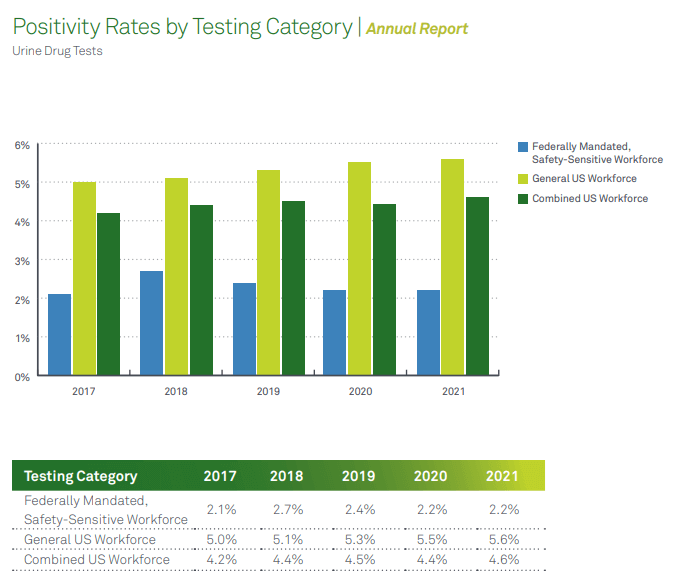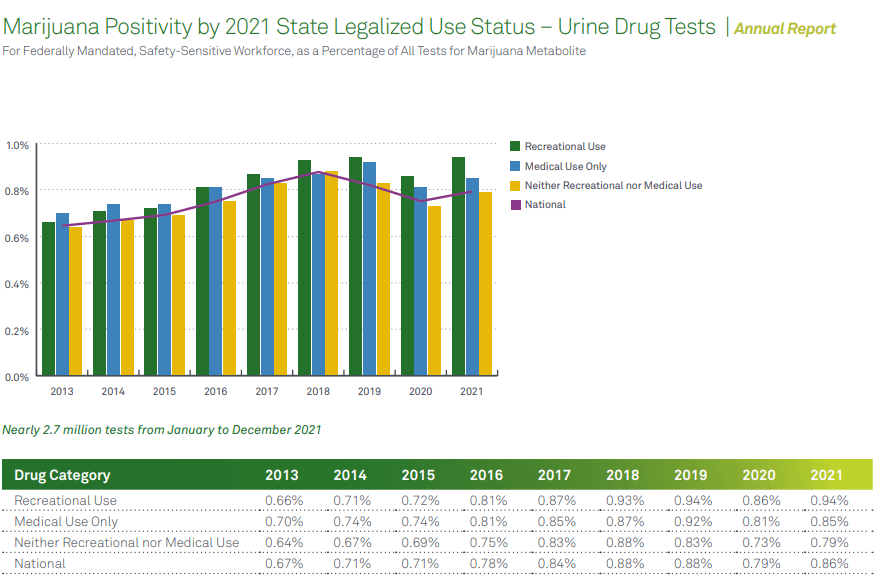As seen from the charts, state legal treatment of cannabis impacts usage rates. Currently, 21 states have decriminalized cannabis for adult recreational use, and 33 permit medical cannabis use. The result is more than half of the people in the U.S. live in a state with legal, recreational marijuana. As state legislatures return to their sessions, this could increase in the next few months. These changes in state laws have created uncertainty and concern about impairment in workplaces, on the roadways and in other locations. Given the increased use of cannabis among the workforce, and especially in states that have legalized and decriminalized cannabis, employers should be able to establish substance-free worksites and use drug testing to determine its impact on safe operations.
NSC believes that all forms of impairment present a serious threat to safety at work by increasing the risk of preventable injury and death. This concern is shared by others as well. In September 2020, more than 20 organizations joined NSC to ask the House of Representatives to hold hearings on the impact on workplace safety of cannabis legalization. Workers who are under the influence of alcohol and/or other impairing drugs (legal or illegal) endanger themselves and those around them. NSC supports employer efforts to maintain a substance-free workplace in order to help ensure the safety of workers.
NSC also believes it is unsafe to be under the influence of cannabis while working in safety sensitive positions.[1] With no scientific test for cannabis impairment, there is no way to determine if someone is impaired with drug testing used today. If there is a reason for the use of cannabis medicinally, workers and employers should discuss moving workers to non-safety sensitive positions while taking cannabis or any other impairing drug for medical treatment.
Impairment from cannabis use is not only a concern in the workplace, but also on the roadway. Driving while under the influence of an impairing substance like cannabis endangers all roadway users. Over the past two years, roadway fatalities have skyrocketed. According to the National Highway Traffic Safety Administration (NHTSA), in the first nine months of 2021, there was a 12% increase in traffic deaths from the same timeframe in 2020. This represents the highest increase in NHTSA’s history and exceeds the nearly 7% increase in traffic deaths from 2020, when there was also a 14% increase in alcohol-impaired driving deaths.
Even more concerning, people driving impaired by multiple substances is on the rise. A 2020 NHTSA study of five trauma centers revealed fatal and serious injuries involving alcohol and cannabis-impaired driving increased; a quarter of these drivers had more than one substance in their systems. The danger of driving while impaired by cannabis is well-established, but evidence suggests many members of the public do not understand the risks. In Washington, Colorado and Oregon, there have been dramatic increases in drug-impaired and multiple substance impaired driving since decriminalizing cannabis.
Better drug impaired driving data are needed for crashes throughout the U.S. To that end, NSC supports implementation of the widely accepted drug impaired driving crash testing guidance in the “Recommendations for Toxicological Investigation of Drug-Impaired Driving and Motor Vehicle Fatalities—2021 Update.” Many labs throughout the U.S. lack resources to conduct testing to these recommendations and need support. Having more toxicology labs testing to the same guidance and standards will help us better understand the problem and develop and implement effective countermeasures.
Because there is no scientific test for cannabis impairment, states rely on law enforcement officers to evaluate the signs of impairment from drugs. The U.S. needs more police officers specially trained in recognizing specific symptoms and behaviors that are caused by drugs (DREs), and law enforcement officers trained in Advanced Roadside Impaired Driving Enforcement (ARIDE).Congress should support funding for training law enforcement officers on suspected drivers with drug impairment and enforcement of applicable laws. Given there is no test for cannabis impairment, states should not establish per se impairment levels.
The lack of an impairment test and more meaningful data on effects of cannabis is a problem we can solve, and NSC urges this committee to evaluate methods to increase research on cannabis. NSC is concerned about secondary effects of moving cannabis from Schedule I of the Controlled Substances Act; therefore, NSC supports the bipartisan Cannabidiol and Marihuana Research Expansion Act (S. 253) that would expand the number of institutions conducting research without changing the scheduling of cannabis. NSC encourages the introduction of similar legislation in the House allowing for further research on the effects of cannabis.
There are many additional issues raised as the legal status of cannabis continues to be debated. As previously shown, cannabis use in states that have changed their laws is increasing, and this trend includes adolescents. The human brain continues to develop through the early and mid-20s, and during this time of development, the brain is sensitive to damage from drug exposure. Early exposure to cannabis during adolescence adversely impacts brain development. Furthermore, a study comparing cannabis use before and after the age of 16 found that people who use it before age 16 made twice as many mistakes on tests of executive function, including planning, flexibility, abstract thinking and inhibition of inappropriate responses.
NSC believes minimum standards for cannabis and cannabis-derived product testing, potency requirements, packaging and labeling should be established and accountability developed to ensure safe products are manufactured. Labeling requirements for cannabis and cannabis-derived products are unclear and in some cases, unsubstantiated ingredient claims are being made. NSC believes all cannabis and cannabis-derived products being sold and distributed must have child resistant packaging, serving sizes, concentration of THC, packaging that is not appealing to children and appropriate warning labels. Standardized labeling should be considered to prioritize safety and prevent unintended consequences. NSC applauds the oversight that has been utilized by some of the agencies here today and encourages more oversight.
Lastly, we also recommend establishing a program to research, develop and implement employer-supported services and resources for workplace mental health and substance use disorders. With 70% of people with an SUD being employed, workplaces can help their people and their loved ones through these diseases.
There is a great deal to consider as we evaluate changing federal and state laws dealing with cannabis. NSC appreciates the thoughtful time and effort of the Committee to evaluate policy changes proposed and the attention on safety impacts. NSC looks forward to working with you to prioritize safety.
[1] “Safety Sensitive” refers to jobs that impact safety of the employee and the safety of others as a result of performing that job. For example, 49 CFR §382.107 defines safety sensitive for commercial motor vehicle operators.


